In this roundup of court judgements, we look at Constitutional Courts’ remarks & directions on frivolous use of offences under UAPA, the welfare of children who lost parents due to COVID-19, prohibition of attempts to “cure” or change the orientation of LGBTQIA+ people, and protection of live-in couples.
Delhi HC: Cautioned the police against the frivolous use of the offences under UAPA and reiterated that right to protest is a constitutionally guaranteed right
In the Delhi riots conspiracy case against student leaders Asif Iqbal Tanha, Natasha Narwal and Devangana Kalita, the Delhi High Court has found that offences under the Unlawful Activities Prevention Act (UAPA) relating to terrorist activities (Sections 15,17 and 18) are not made out prima facie and hence they are entitled to grant of bail under the ordinary principles under the Code of Criminal Procedure.
In the context of Northeast Delhi communal riots which took place in the last week of February 2020, the Delhi Police had filed a charge sheet against the three student leaders alleging that the protests organized by them against the Citizenship Amendment Act (CAA) from December 2019 were part of a “larger conspiracy”.
The court noted that the essential aim and intent of the activities, in which the appellants have alleged to have been involved, was to orchestrate and participate in a protest across the city of Delhi to oppose the enactment of the CAA. The Court further noted that while the protest was monitored by law enforcement agencies, the CAA protests were not outlawed or banned. The student organizations, which the accused were leading, are not banned organizations.
Reiterating that the right to peaceful protest is a constitutional right flowing from Article 19(1)(a) of the Constitution, the court held that the allegations of making inflammatory speeches, organizing chakka jams, and other such actions that are not uncommon to protests and will not amount to a ‘terrorist act’ under the UAPA. The court noted that the mere use of alarming and hyperbolic verbiage in the charge sheet did not reveal any prima facie offence as the charge sheet did not contain any elemental factual ingredients that are a must to the offences defined under Section 15, 17 or 18 UAPA.
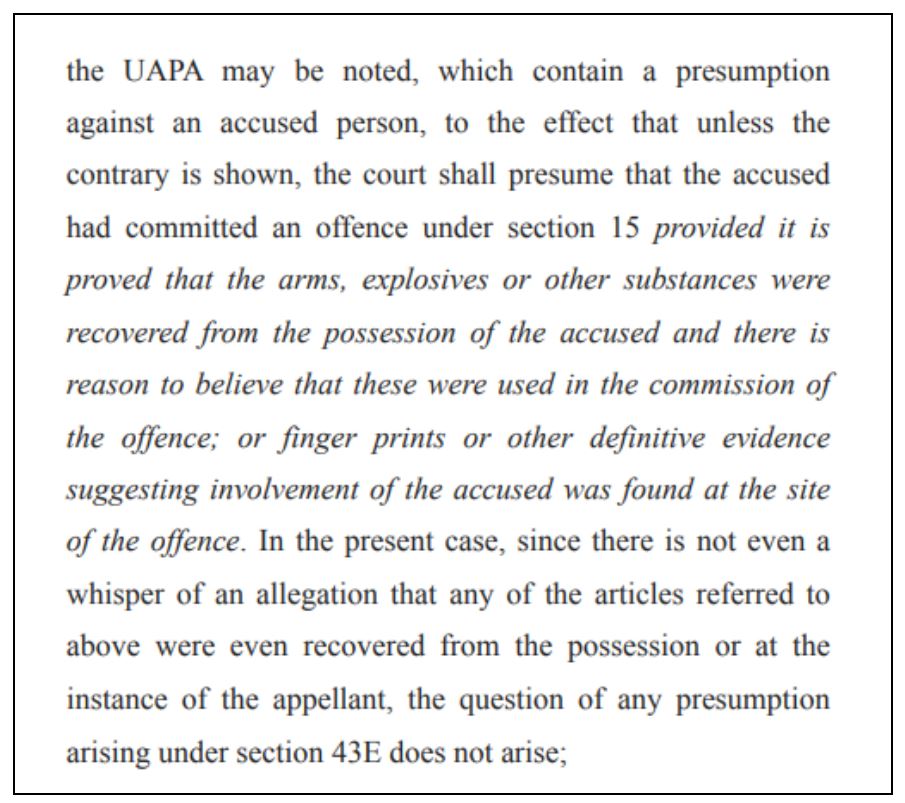
The court, therefore, cautioned the police against the frivolous use of the offences under UAPA against acts which are otherwise covered under ordinary penal laws, and remarked that “Foisting extremely grave and serious penal provisions engrafted in sections 15, 17 and 18 UAPA frivolously upon people, would undermine the intent and purpose of the Parliament in enacting a law that is meant to address threats to the very existence of our Nation.”
Supreme Court: Issues direction regarding education, illegal adoption and welfare of children who lost parents due to COVID-19 pandemic
In a suo moto proceeding regarding the problems of children during COVID-19, the supreme court directed the State and UT governments to ensure that there is no break in the education of children who have lost either one or both parents due to the pandemic.
The apex court noted that as per data collected by the National Commission for Protection of Child Rights (NCPCR) till June 2021, a total of 30,071 children have become orphans or have lost one parent or abandoned due to the COVID-19 pandemic. Specifically, 3,621 children have become orphans, 26,176 children have lost one parent and 274 children have been abandoned. The court ordered that after the identification of the children who have become orphans or lost one parent, prompt action has to be taken to provide for the basic needs of the children.
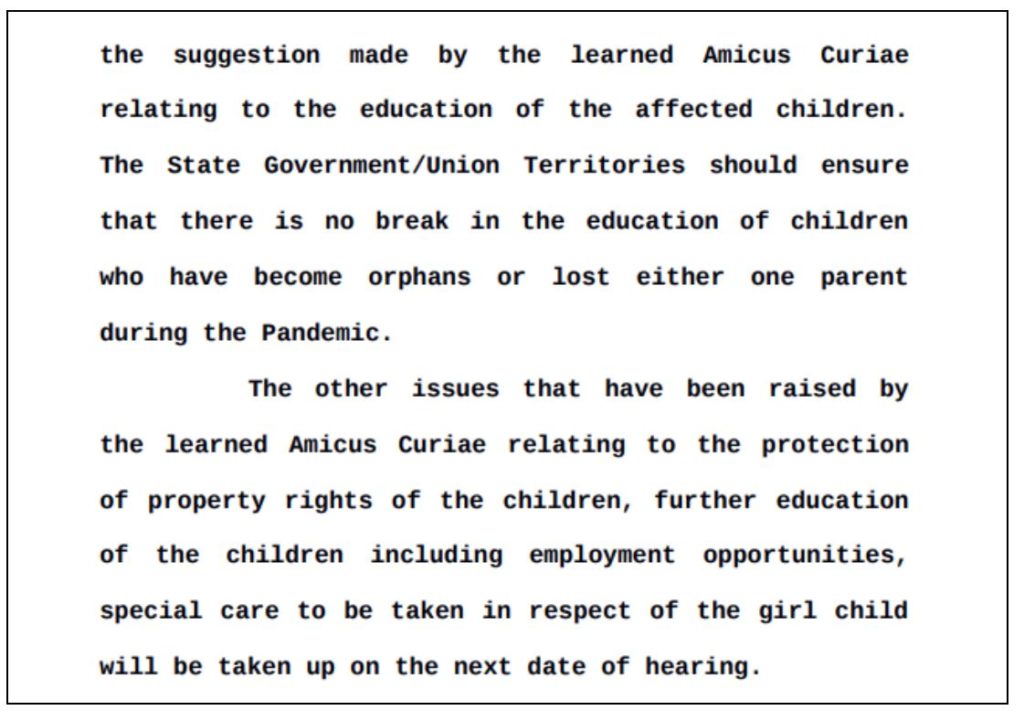
In view of this, the court issued the following directions:
- The State Governments/Union Territories are directed to continue identifying the children who have become orphans or lost a parent after March 2020, either due to COVID-19 or otherwise and provide the data on the website of the NCPCR without any delay. The identification of the affected children can be done through Childline (1098), health officials, Panchayati Raj Institutions, police authorities, NGOs, etc.
- The District Child Protection Units (DCPU) is directed to contact the affected child and his guardian immediately on receipt of information about the death of the parent/parents. The assessment shall be made about the suitability and willingness of the guardian to take care of the child. The DCPU should ensure that adequate provisions are made for ration, food, medicine, clothing, etc. for the affected child. Financial assistance to which the disconsolate child is entitled to under the prevailing schemes by the Central Government and the State Governments/Union Territories should be provided without any delay.
- The District Child Protection Officer (DCPO) should furnish his phone number and the name and phone number of the local official who can be contacted by the guardian and the child. There should be a regular follow-up by the concerned authorities with the child at least once a month.
- If the DCPO is of the prima facie opinion that the guardian is not suitable to take care of the child, he should produce the child before the Child Welfare Committee (CWC) immediately.
- CWC should provide for the essential needs of the child during the pendency of the inquiry without fail. The inquiry should be completed expeditiously. CWC shall ensure that all financial benefits to which the child is entitled are provided without any delay.
- The State Governments/Union Territories are directed to make provisions for continuance of education of the children both in Government as well as in private schools.
- The State Governments/Union Territories are directed to take action against those NGOs/individuals who are indulging in illegal adoptions.
- Wide publicity should be given to the provisions of the Juvenile Justice (JJ) Act, 2015 and the prevailing schemes of the Union of India and the State Governments/Union Territories which would benefit the affected children.
- DPCO shall take the assistance of government servants at the Gram Panchayat level to monitor the welfare of the disconsolate children who are devastated by the catastrophe of losing their parent/parents.
Madras HC: Prohibits attempts to “cure” or change the sexual orientation of people belonging to LGBTQIA+ community
In the case of S. Sushama and another v Commissioner of Police and others, the high court directed the Union and State government to take steps in order to prohibit attempts by physical and health professionals to “cure” or change the sexual orientation of people belonging to LGBTQIA+ community.
The high court highlighted that the practice of conversion therapy (a group of therapies directed at “correcting” non-heterosexual and non-cisgender people), in any form or method, is unfortunate and needs to be appropriately criminalized. The bench of Justice Anand Venkatesh observed that such pseudoscience is peddled to worried and anxious parents of LGBTQIA+ children even today by quacks and self-serving doctors.
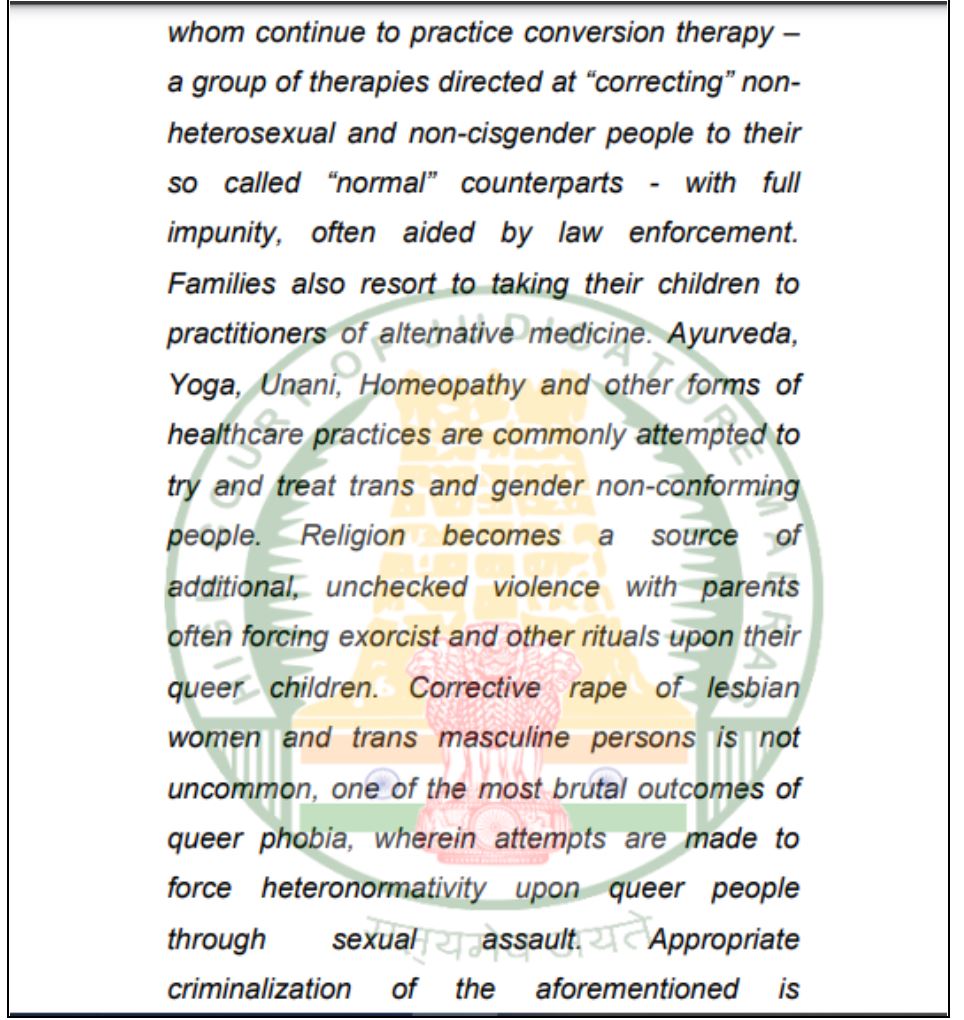
The Court has directed that action should be initiated against the concerned professional involving themselves in any form or method of conversion “therapy”, including withdrawal of license to practice.
Our previous review covered the salient features of the judgement, wherein the high court issued a slew of guidelines to ensure that LGBTQIA+ persons are not harassed by police in missing complaints lodged by their parents.
Some of the significant directions issued by the high court in the present case for the sensitization of police, judiciary, educational institutions, and health care professionals regarding LGBTQIA+ issues are as follows:
1. Educational institutions
- Parent Teachers Association (PTA) meetings should be used to sensitize parents on issues of the LGBTQIA+ community and gender nonconforming students so as to ensure supportive families.
- Further, the necessary amendments should be made to policies and resources to include students belonging to the LGBTQIA+ community in all spheres of school and college life. In this regard, the following suggestions were issued:
- Ensure availability of gender-neutral restrooms for the gender-nonconforming student.
- Change of name and gender on academic records for transgender persons.
- Inclusion of ‘transgender’ in addition to M and F gender columns in application forms for admission, competitive entrance exams, etc.
- Appointment of counsellors who are LGBTQIA+ inclusive, for the staff and students to address grievances, if any, and to provide effective solutions for the same.
- In addition to the above, the government shall take effective steps to implement measures in relation to transgender persons as stipulated by Chapter VI of The Transgender Persons (Protection of Rights) Act 2019 and Rule 10 of the Transgender Persons (Protection of Rights) Rules, 2020.
2. Judiciary
- Conduct awareness programmes for Judicial Officers at all levels in coordination with the enlisted NGOs and community support and to provide suggestions/ recommendations to ensure non-discrimination of persons belonging to the LGBTQIA+ community.
3. Police and Prison authorities
- Programs should be held at regular intervals on steps to be taken for protection from and prevention of offences against the LGBTQIA+ community.
- Conduct sensitization about the legal rights of the LGBTQIA+ community at regular intervals.
- Not limited to the above programs, sensitization programs are to be conducted for police personnel creating awareness about the Offences and Penalties as stipulated under Chapter VIII of The Transgender Persons (Protection of Rights) Act, 2019 and compliance with Rule 11 of the Transgender Persons (Protection of Rights) Rules, 2020.
- Outreach programs should be conducted by the NGOs with community support to put forth first-hand problems faced at the hands of law enforcement agencies, and to train them in providing effective assistance. Ensure that transgender and gender-nonconforming prisoners are housed separately from cis-men prisoners to eliminate chances of sexual assault by the latter on the former.
4. Physical and Mental Health Professionals
- Mental health camps and awareness programs should be conducted to understand gender, sexuality, sexual orientation and promote acceptance of diversity.
- Any attempts to medically “cure” or change the sexual orientation of LGBTIQA+ people to heterosexual or the gender identity of transgender people to cisgender should be prohibited.
- Action should be initiated against the concerned professional involving themselves in any form or method of conversion “therapy”, including withdrawal of license to practice.
Supreme Court: Orders protection of live-in couples who were denied relief by P&H high court
While hearing an appeal against the judgement and order of Punjab & Haryana high court which refused to grant protection for live-in couples, the supreme court directed the Superintendent of Police to grant protection to petitioners in view of the apprehensions/ threats in accordance with the law, uninfluenced by the observations of the High Court.
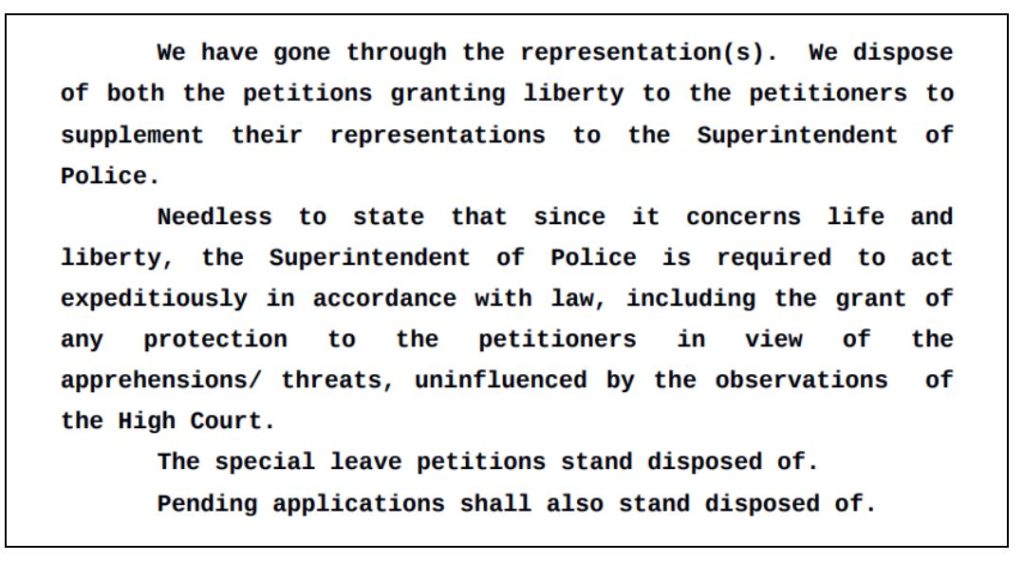
The P&H high court dismissed the prayer of protection by a live-in couple who approached the court after they faced opposition to their relationship and held that live-in relationships are “morally and socially not acceptable”. The court also observed that the couple approaching the Court so as to obtain a seal of approval on their “morally and socially not acceptable” relationship.
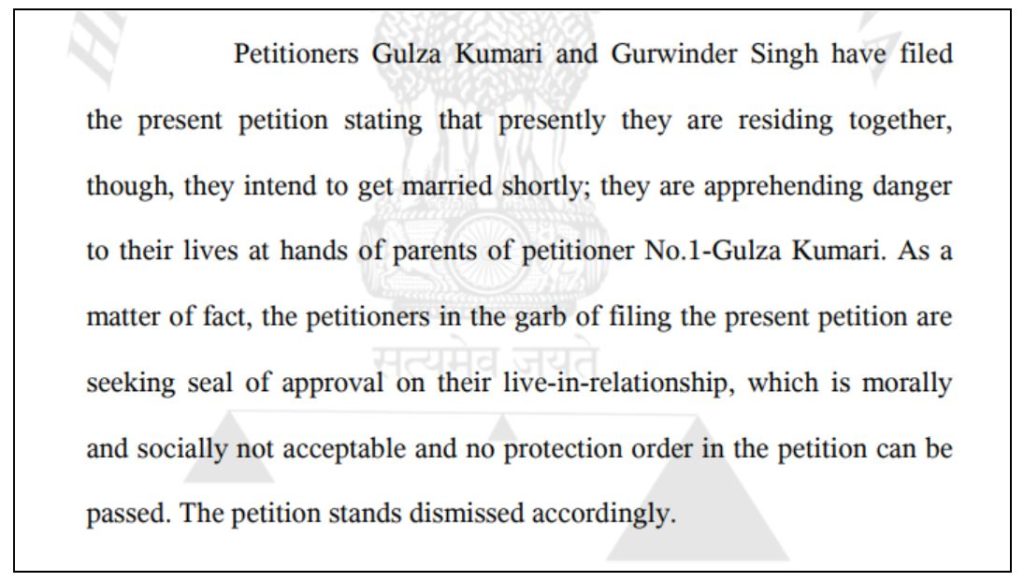
In the present case, the supreme court ordered protection for the couple and granted them the liberty to supplement their representations to the Superintendent of Police.
Featured Image: Important Court Judgements


